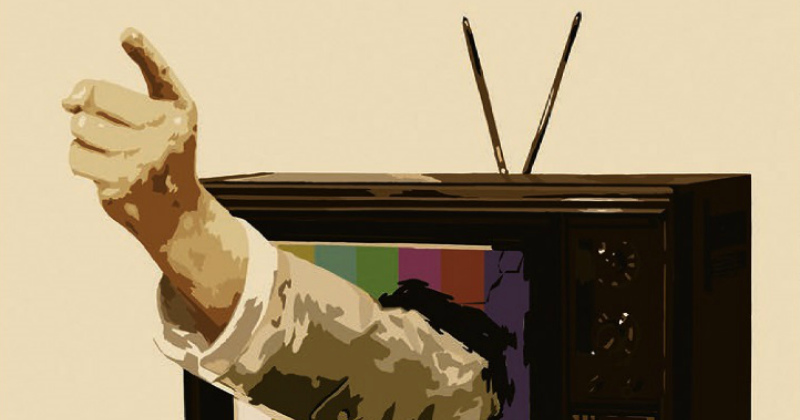
These days, one hears Network most often discussed as a predictive force, noting how screenwriter Paddy Chayefsky saw the modern television age coming. Unfortunately, his prognosis wasn’t for a landscape of quality cable dramas. Rather, Chayefsky felt the corporate takeover of television would result in the fairly regular practice of doing anything and everything for better ratings, regardless of its educational, moral, or artistic value (or lack thereof). In many ways, he was certainly proven right. There’s a part in Network wherein former news anchor Howard Beale notes, “And when the twelfth largest company in the world controls the most awesome God-damned propaganda force in the whole godless world, who knows what shit will be peddled for truth on this network?” And one need only have a passing familiarity with TV news to see the truth that’s come of that.
But Network is not Sybil the Soothsayer, tossing out a possible future for us to see how it works out. Network isn’t even about the future – the damn thing opens in 1975, a year before the picture opened, and concludes the year it was released. Network is about the present, about staying closely attuned to the movements in the world around you, lest they devour you. Or, you know, have you assassinated by leftwing militants.
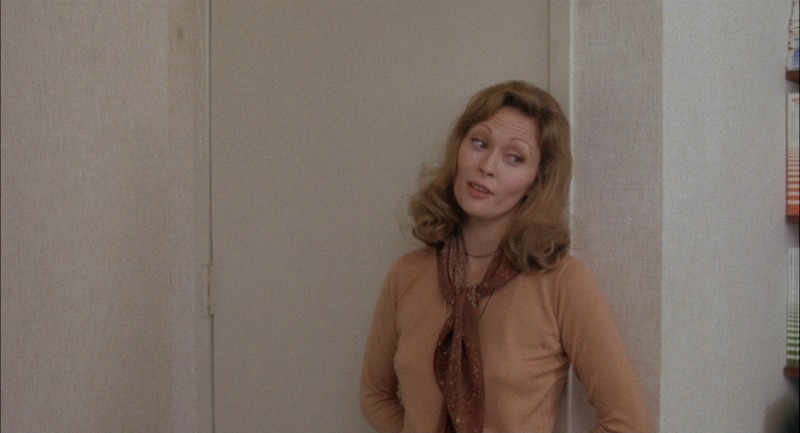
On the day I’m writing this, Star Wars Celebration was a major topic on Twitter. This is a somewhat-regular convention for fans of the franchise to gather together, ask questions of the cast and crew of past and future films, and generally, I’d imagine, celebrate the franchise they all love. It was also started by Lucasfilm in 1999 to promote The Phantom Menace, and has fairly regularly served that same purpose (you may or may not be aware of the new Star Wars movie coming out in December). On some level, yeah, it’s still an outlet for fans to cheer on something they love, and some may view that duality as not inherently contradictory or problematic. The studio can both foster and take advantage of natural enthusiasm.
The inciting incident – to use screenwriting manual terminology – in Network is Howard Beale losing his job. With nothing left to live for and a very negative view of the industry in which he’s worked, he tells his viewers he will kill himself live on the air for his final broadcast. This causes an uptick in viewership, and after some starts and stops, Howard Beale becomes a major sensation with the now-legendary “mad as hell” speech, which captures the public’s attention in a way television only rarely does.
Act two picks up with the aftermath of this event. Beale’s nightly news show has now become more akin to a late-night talk show, with regular gimmicky guests (including the aforementioned soothsayer), an announcer to rev the crowd up, and a planned, timed moment for the crowd to yell “we’re mad as hell, and we’re not going to take it anymore.” What was once an urgent cry of helplessness has now become a corporately branded slogan.
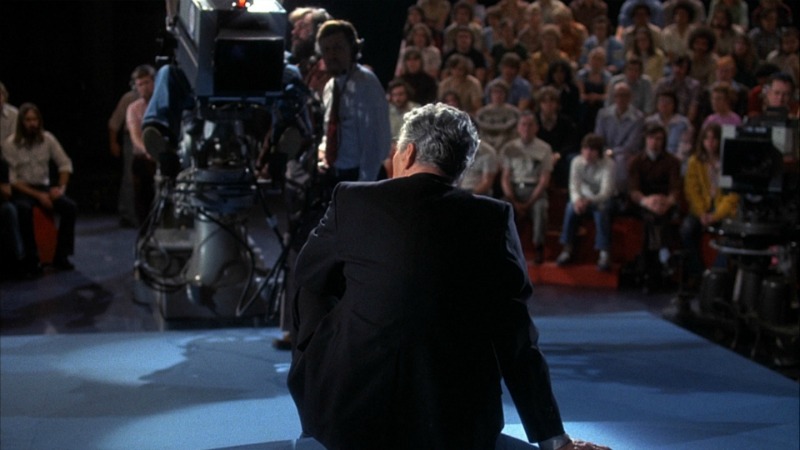
More than the particulars of broadcasting, what really stood out to me in this viewing of Network was how Chayefsky so totally recognized this tendency for businesses to latch onto something pure and spontaneous, unplanned as a success, and beat it into the ground in an effort to wring every last dollar from it. This is not merely him predicting the future of television, nor even commenting on television exactly. This is him recognizing a powerful force in this world, and how it will twist, monopolize, and squander something potentially important, and worse, make you complicit in this process all while reassuring you that it is still that vital, personal thing you liked all along.
And lest this, too, be viewed as predictive, remember that the decades preceding it were major years for the fan magazine, fan mail, fan events, and all manner of media companies exploiting the pure, genuine enthusiasm they sought to foster.
It is also a damn fine piece of drama with immensely satisfying dialogue, and not a little heart. It’s maybe a little overambitious – several major character arcs have to be stated rather than experienced, and it really loses track of Howard altogether in the second act, despite him being the only thing anyone can talk about. Max Schumacher (William Holden) is the emotional center of the piece, and watching him flail in the second act is a real treat. Costume designer Theoni V. Aldredge does remarkable work here, dressing him in younger and “hipper” clothing the deeper he gets into his affair with programming executive Diana Christensen (Faye Dunaway). He never quite seems to fit.
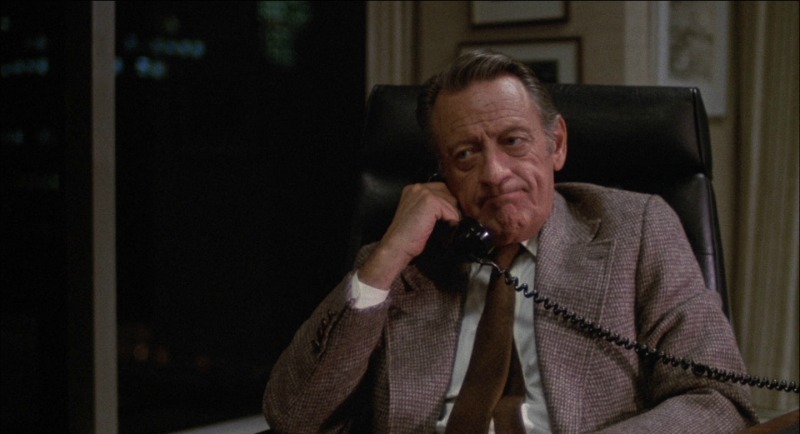
Network may not seem like the sort of film that really calls for a Blu-ray upgrade, but let me tell you a little story. When I bought my first HDTV, my roommate and I spent the afternoon cycling through discs, adjusting the settings, and generally testing out this fancy new toy that had wandered through our door. The first full film we watched, however, was Network, because he hadn’t seen it before. By the time the credits came up, he suddenly said, “damn this TV is righteous.” After an afternoon of action films, art dramas, and anything else you’d use to test out your new TV, it was Network that seemed to really pop.
Seeing it now on Blu-ray, thanks to Arrow Film’s new (Region B locked) edition, Network popped once again. There are a handful of scenes in darker environments, and the contrast there is well handled – for a 70s film, true black doesn’t look quite right; it needs to a little muddy, a little grainy, and that is handled quite well here – but this is often a movie of booming white and yellow rooms, and that is what makes Network look so damn good. It puts everything out in the open, and asks us to dig around for what’s being hidden. As with the darkness, Arrow manages to not overdo Network‘s brightness, giving it a slightly faded, burnt-out quality. It’s like the most beautiful florescent lighting you’ve ever seen. (Screencaps provided by DVD Beaver)
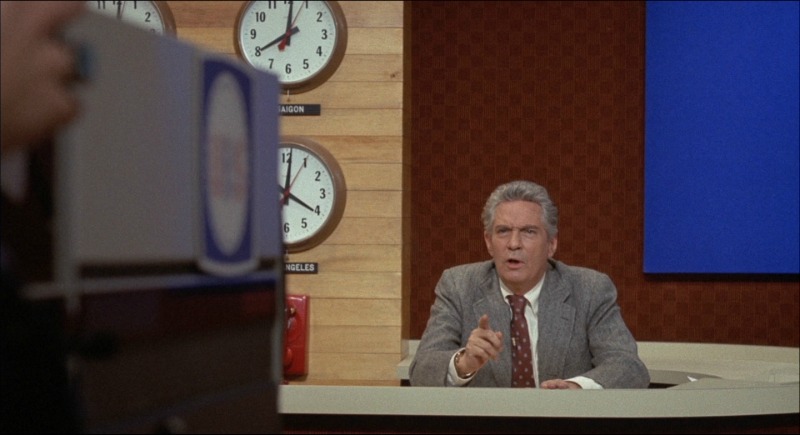
Arrow’s edition somewhat pales in comparison to the array of supplements offered by WB on their American Blu-ray release, unfortunately, and one of the two major supplements comes from that The Directors TV series that sort of drives me up the wall. An hourlong program about Lumet’s career, it gets interviews with many of his major collaborators (who were still alive by the late 90s/early 2000s) without offering a great deal of insight. It’s a survey, meant to make for pleasant viewing on weeknight TV. Howard’s proclamation in Network that they’re in the boredom-killing business is quite applicable. Much, much better, however, Dave Itzkoff’s visual essay on the making of the film, looking at how such an unusual and risky project came together. Itzkoff is an engaging speaker working with great material (much of it adapted, I’m sure, from his book Mad as Hell: The Making of Network and the Fateful Vision of the Angriest Man in Movies), and very much kept me involved and interested for its forty-five minutes.
The disc also comes with a booklet with an essay by Mike Sutton and an article from American Cinematographer.
Network was one of my absolute favorite films through the end of high school and into college, one I watched so many times in that period that I’ve scarcely revisited it since. Yet seeing it again this past week, I was surprised how many small details I’d forgotten, and how much my general sense of the film had changed in the years since. I loved it then for how closed-off it felt, how thoroughly I felt it summarized the media landscape and the people within it. What I love now is how open-ended it feels, its many contradictions and quiet conflicts. I’d never really thought before how Diana Christensen goes from having her heart broken (perhaps for the first time in so devastating a manner) to, the very next scene, outlining the benefits of murdering a man. I didn’t think about how expertly it builds momentum towards the “mad as hell” speech, or how much the shadow of that envelopes act two (that two-act structure itself being an unusual one for film, but one which Chayefsky would know well). But mostly, I should have given more credit to Marlene Warfield, who really deserved that Best Supporting Actress Oscar.


